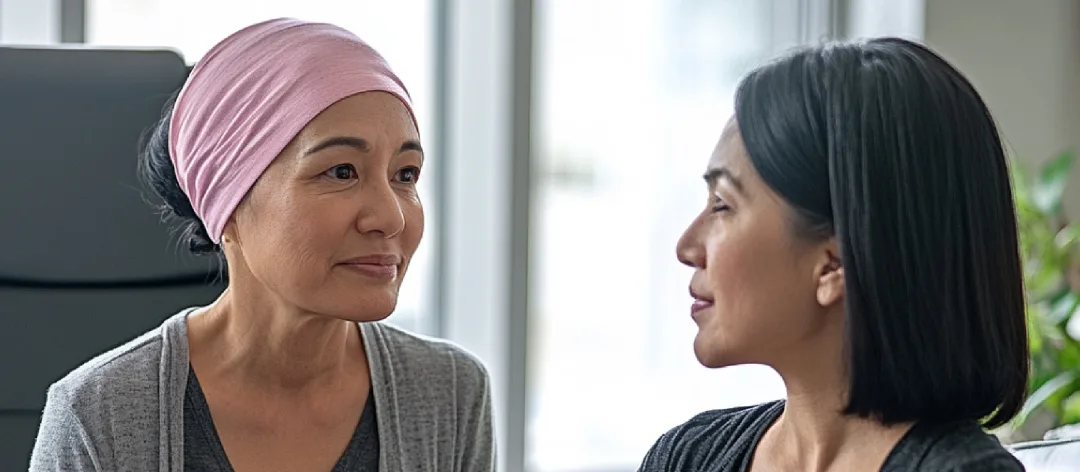Did you know that there are over 18 million cancer survivors worldwide, thanks to advancements in cancer treatment?
Thanks to modern therapies and cutting-edge medical innovations, more people than ever are overcoming cancer and living fulfilling lives.
Every cancer patient needs more than just medical care—they need unwavering support from family, friends, and reliable resources to guide them through every step, before, during, and after treatment.
This article is to empower you with the knowledge and tools needed to make informed decisions about your care.
From understanding treatment options to highlighting the top destinations for cancer care, we provide everything you need to approach cancer treatment with confidence and hope.
1. Finding Cancer Care

Understanding oncology, the branch of medicine dedicated to the prevention, diagnosis, and treatment of cancer is an important step in navigating your cancer care journey.
Oncologists, the specialised doctors in this field, lead the management of cancer treatments, tailoring strategies to the specific type and stage of your diagnosis.
A cancer care team extends beyond oncologists to include a multidisciplinary group of health professionals. They include:
- Radiologists
- Pathologists
- Nurses
- Dietitians
- Social workers counsellors
- Physical therapists
- Rehabilitation specialists
Getting a Second Medical Opinion in Cancer Treatment
A second medical opinion involves consulting a different medical professional from the one you had initially seen to review your diagnosis or treatment plan.
A second medical opinion can confirm your initial diagnosis, provide alternative treatment options, or identify clinical trials for complex or rare cancers.
Seeking a second opinion is especially valuable when considering alternative cancer treatment options or if you feel uncertain about your current recommendations.
This practice ensures every aspect of your care is thoroughly evaluated and aligns with your goals, empowering you to make informed decisions and approach your cancer treatment with confidence.
2. Making Decisions and Managing Cancer Treatment

Understanding how cancer treatment decisions are made empowers you and your family, by ensuring active participation in the decision-making process.
Oncology care teams base their recommendations on several factors such as:
i) Type of cancer
The type of cancer is one of the most significant determinants, as treatments differ widely between solid tumour cancers, blood cancers, and rare cancers.
ii) Cancer stage
The stage of the cancer is equally critical, with localised cancers often treated with surgery or radiation and more advanced cases requiring systemic approaches like chemotherapy or targeted therapy.
Localised cancers are confined to their site of origin without spreading to nearby tissues or distant organs.
Stages of cancer and their corresponding treatment options
| Cancer | Description | Common Treatment Options |
| Stage 0 | Localised; carcinoma in situ; no invasion of deeper tissues or spread. | Surgery (e.g., excision), localised treatments (e.g., laser therapy), or observation in low-risk cases. |
| Stage I | Localised but may have grown slightly into nearby tissues. | Surgery to remove the tumour; radiation therapy; possible hormone therapy or adjuvant chemotherapy for certain cancers. |
| Stage II & III | More advanced localised disease; may involve regional spread to nearby lymph nodes. | Combination treatments: surgery (e.g., mastectomy, colectomy), followed by chemotherapy, radiation, or targeted therapies. |
| Stage IV | Metastatic cancer; spreads to distant organs. | Systemic therapies (e.g., chemotherapy, immunotherapy, targeted therapy); palliative surgeries or radiation for symptom management. |
Doctors use diagnostic tests such as bloodwork, imaging scans, or genetic profiling to help them create a treatment plan tailored to your specific cancer.
Your overall health and any pre-existing conditions are always considered to ensure the chosen cancer treatments are safe and effective.
Lastly, your personal preferences play a vital role; you may prioritise specific treatment outcomes or quality-of-life factors, which should always be discussed openly with your medical team.
3. Common Cancer Treatment Options

Being well-informed about the most suitable treatment options for your case helps you undergo cancer treatment with optimism and clarity.
Here are common cancer treatment options for patients:
Surgery
Surgery is often the first step of cancer treatment, particularly for early-stage cancers.
The procedures range from removing the tumour and surrounding tissues to preventive surgeries for high-risk individuals and reconstructive surgeries to restore form or function.
Advancements like laparoscopic and robotic-assisted surgery have improved precision, safety, and recovery times.
Laparoscopy uses small incisions and cameras, reducing pain and hospital stays, while robotic systems enhance precision in complex procedures, particularly for prostate, kidney, and gynaecological cancers.
In advanced stages, surgery may be combined with other therapies, such as chemotherapy or radiotherapy, to improve outcomes.
The role of surgery in cancer treatment varies depending on the cancer type and stage, but it remains one of the most effective tools for eliminating or reducing cancerous growths.
Radiation Therapy
Radiation therapy uses high-energy beams to destroy cancer cells. Internal radiation, or brachytherapy, involves placing radioactive material near or inside the tumour.
The most common type is external beam radiation, where the tumour is targeted from outside your body.
A notable advancement in radiation therapy is Proton Therapy, which delivers high precision treatment by targeting tumours while sparing surrounding healthy tissues.
Apollo Hospital, Chennai, India pioneered Proton Therapy in South Asia and the Middle East, offering international patients access to this advanced, effective cancer treatment alternative.
Radiation is often used in combination with surgery or chemotherapy to maximise its effectiveness.
Chemotherapy
Chemotherapy, one of the most well-known cancer treatments, targets rapidly dividing cells to combat cancer effectively.
It is typically administered in cycles, with each session followed by a recovery period, and the duration of treatment can range from weeks to months depending on the cancer type and stage.
While side effects such as fatigue, nausea, and hair loss are common, advancements in supportive care have significantly improved their management, helping patients maintain a better quality of life.
Before starting chemotherapy, you may undergo pre-treatment tests, such as bloodwork and imaging, to assess overall health and prepare for treatment.
Post-treatment, follow-up care often includes monitoring for side effects and assessing treatment efficacy.
iv) Hormone Therapy
Hormone therapy is an effective treatment for cancers that rely on hormones to grow, such as breast and prostate cancer.
It works by either blocking the body’s ability to produce certain hormones or preventing hormones from acting on cancer cells.
This therapy helps to slow or stop the growth of hormone-sensitive tumours and is often used in combination with surgery, chemotherapy, or radiation for a comprehensive treatment plan.
Common side effects may include fatigue, hot flashes, weight gain, and mood changes, depending on the specific approach used.
Read: Advanced Cancer Treatments Offered Internationally
Targeted Therapy
Targeted therapy is a precise cancer treatment that focuses on specific proteins or genetic markers involved in cancer cell growth and survival.
By targeting specific molecular pathways involved in cancer growth, this approach minimises damage to healthy cells and provides a more precise and individualised treatment strategy compared to traditional chemotherapy.
Targeted therapies are often tailored to the cancer’s specific characteristics, which are identified through advanced diagnostic tests.
Side effects vary depending on the drug but may include fatigue, skin rashes, diarrhoea, and elevated liver enzymes.
Immunotherapy
Immunotherapy is a modern cancer treatment that empowers the body’s immune system to detect and destroy cancer cells.
It works by enhancing immune responses or overcoming mechanisms cancer cells use to evade immune detection.
Common forms include immune checkpoint inhibitors and CAR-T cell therapy. This approach has achieved remarkable success in certain cancers, such as melanoma and lung cancer.
Common side effects include inflammation-related symptoms such as fatigue, skin irritation, fever, or flu-like symptoms.
Some patients may experience more severe immune-related reactions requiring medical attention.
Bone Marrow Transplant
A bone marrow transplant replaces damaged or destroyed bone marrow with healthy stem cells to regenerate blood cells. It is often used to treat blood cancers like leukaemia or lymphoma.
The procedure involves extracting stem cells from the patient or a donor, followed by their infusion after high-dose chemotherapy or radiation to eradicate cancer cells.
Common side effects include an increased risk of infection, nausea, fatigue, and in some cases, graft-versus-host disease (if the transplant is from a donor).
Read: Leading Bone Marrow Transplant Hospitals in the World
4. Integrative and Complementary Therapies
Medical interventions in cancer treatment are most effective when combined with complementary therapies. These evidence-based approaches address physical, emotional, and mental well-being alongside conventional medical care.
Nutrition and Diet
A well-balanced diet plays a vital role in supporting cancer treatment and recovery. Proper nutrition can strengthen the immune system, enhance the body’s ability to heal, and reduce treatment-related fatigue.
Consulting a dietitian who specialises in oncology can help patients create personalised meal plans that address their unique nutritional needs and any side effects from treatment.
Physical Activity
Physical activity, even in moderate forms like walking or yoga, has numerous benefits for cancer patients. Exercise improves energy levels, reduces fatigue, and helps maintain muscle strength.
It also has psychological benefits, such as reducing anxiety and depression, which are common during cancer treatment. Doctors often recommend light, regular exercise tailored to the patient’s capabilities.
Mind-Body Practices
Mind-body practices such as meditation, acupuncture, and mindfulness can complement medical treatments by reducing stress, improving sleep, and alleviating pain.
These practices are supported by research showing improved quality of life among cancer patients who integrate them into their care.
While not a replacement for conventional treatment, they provide significant emotional and physical benefits.
Alternative Medicine
Alternative medicine, including herbal supplements or unconventional therapies, is often sought by cancer patients.
However, it is essential to approach these cautiously and under the guidance of a healthcare provider to avoid potential interactions with conventional treatments.
5. Receiving Cancer Treatment Abroad
Travelling abroad for cancer treatment is a viable option for receiving advanced care, affordable pricing, or specialised expertise.
This approach allows access to cutting-edge treatments, world-renowned specialists, and healthcare systems tailored to international patients' needs.
Top destinations for cancer treatment abroad
| Country | Cancer Hospitals | Description |
| India | Renowned for affordable yet high-quality care, including advanced therapies like Proton Therapy. | |
| Turkey |
| Combining modern facilities and highly skilled medical professionals with competitive costs. |
| UK | Bishops Wood Hospital Cancer Centre, London | Offering advanced research-based treatments, including access to clinical trials. |
| UAE | Known for cutting-edge technology and comprehensive care centres, especially in Dubai and Abu Dhabi. | |
| Thailand | Bumrungrad International Hospital, Bangkok | World-class cancer care blending advanced treatments, wellness programs, and tranquil environments. |
| Singapore | Raffles Hospital | Advanced cancer care with precision medicine, serene recovery, and patient-focused facilities. |
| Malaysia | Sunway Medical Centre, Subang Jaya | Affordable cancer treatments, modern facilities, and integrative care for holistic recovery. |
Read: 10 Best Cancer Treatment Hospitals in The World 2025
Consideration for Patients Travelling Abroad
Patients considering treatment abroad should verify the facility's accreditation and research the expertise of the medical team.
Ultimately, receiving treatment abroad can provide not only financial savings but also access to treatments and expertise that may not be readily available at your home country.
6. Survivorship and Quality of Life

Post-Treatment Care
Life after cancer treatment requires ongoing monitoring to detect any recurrence early. Regular follow-up appointments, imaging, and blood tests are essential components of survivorship care.
Patients are also encouraged to adopt healthy lifestyles, including balanced diets and regular exercise, to support long-term health.
Managing Long-Term Side Effects
Cancer survivors often face lasting physical and psychological effects from treatment. Chronic fatigue, neuropathy, and body image concerns are common.
Psychological support, including counselling and therapy, can help patients address these challenges and adjust to life after treatment.
Support Systems
Support systems play a vital role in a cancer patient’s recovery journey. Local and online support groups provide a space to share experiences and connect with others who understand the challenges of cancer treatment.
Professional counselling services can also help patients and their families cope with the emotional and mental health impacts of the disease.
Palliative and Hospice Care
Palliative and hospice care focus on enhancing quality of life, for patients undergoing cancer treatment.
These services prioritise pain management, emotional support, and assistance with daily activities, ensuring patients and their families experience comfort and dignity during challenging times.
In Conclusion
All patients need support for the best possible outcomes from their cancer treatment, and My 1Health is here to provide it.
We connect you to leading cancer hospitals around the globe, that are within our network, ensuring access to top oncology specialists and advanced treatment options.
A dedicated patient support specialist will guide you through every step of the process, ensuring your journey is smooth and focused on healing.
We arrange telemedicine consultations with expert oncologists who provide personalised treatment plans from the hospital of your choice.
Our team ensures all necessary documents for travelling abroad are prepared and valid, removing logistical burdens.
We also coordinate travel arrangements, including flight bookings, comfortable accommodation near treatment centres, and airport transfers, so you can focus entirely on your health.
After treatment, we support you through follow-up care, helping you schedule appointments and stay on track with your recovery plan.
My 1Health is dedicated to simplifying the complexities of cancer treatment, offering the support you need to access world-class care and achieve the best possible outcomes.
Connecting patients to world-class medical care through our trusted hospital network

